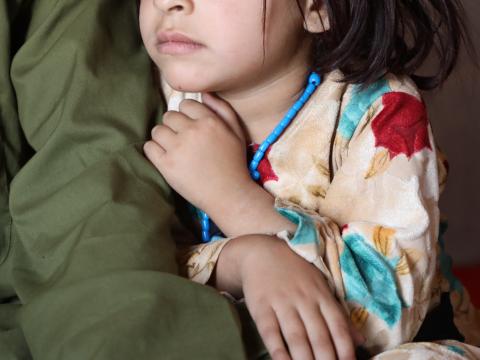Desperate parents are forced to sell one child to feed the others

Seven-year-old *Maryam sits at her father’s left side with her elbow on his leg. She looks directly at the camera. Sometimes she whispers a few words in her father’s ear. She plays with her beautiful brown hair, sometimes removing it from her face with her left hand and hiding the hair behind her right ear.
Maryam’s family moved from her native Badghis province to an IDP (Internally Displaced Persons) camp in Herat City four years ago.
“Drought and hunger moved us from our native area to here. I used to work as a farmer on my land, but when drought hit, I worked for other farmers for a while,” said Maryam’s father, *Qasem.
However, he didn’t work regularly and didn’t earn enough money to feed his family. He began borrowing food items from a neighborhood shop.
After borrowing for two years, Qasem could not pay off the debt because he did not have any source of regular income. He made a hard decision to sell his land to pay off his debts. After making his payments, no additional money was left over to buy food for his children who cried because of hunger every day and night.
He started borrowing again. “I would borrow flour, oil, and other food items from the shopkeeper,” says Qasem,. “After a while the shopkeeper refused to give me food anymore and asked for his money. But I did not have anything to give him.”
One day the shopkeeper came to his house demanding payment, but Qasem still had no money. “The shopkeeper asked me to sell him my daughter [Maryam]. I did not have any alternative, so agreed to sell my daughter for 200,000 Afs [US$ 2,250] so that I can pay off the loans and feed my children for a while. I need to pass the girl to him at her age 13,” says Qasem.
Qasem’s eight-year-old son, *Samir, has an eye disease that doctors say can only be treated by doctors in a neighboring country. “The disease of my son makes all the family suffer. Although I spent the money I had borrowed for his treatment, there wasn’t any improvement with the treatment,” Qasem explained with pain in his voice.
Twenty-five-year-old *Halima, Maryam’s mother, says, “I would never think I will need to make a hard choice to sell my daughter. I told my husband to go and work to pay off the debts instead of selling our daughter. He said that he looks for a job everyday but cannot find any. I am not able to do anything to prevent my daughter from being sold but screaming and crying.”
Halima says that if they manage to pay the money back, they can cancel this agreement and save Maryam from child marriage. They only have five years to raise this amount.
“Look at this child,” says a teary-eyed Halima as she points to Maryam. “Does she deserve to be given to husband by force? This child is unaware of everything. However, when she grows up and starts realising what happened, she will suffer for her entire life.”
Even in Herat Qasem rarely finds jobs. Twice he traveled to a neighboring country hoping to return with some money to pay off the debts and also feed his children, but both times he has been deported. “We were completely hopeless,” says Halima.
Halima makes yarn from wool, but she also has other duties and takes care of the children. She earns 50 Afs [US$ 0.60] per day and purchases flour to bake bread for her children with this money.
She says that currently they do not have any flour at home to bake bread so she borrowed some flour from her mother in order to feed her children.
Qasem worked for two days in a farm that week, but his wage had not been paid yet. When Qasem’s wages arrive, they hope to have bread for three or four more days.
“My dream is to pay off the debts to get my daughter released from that person. I also wish for us to be able to feed our children since I suffer days and nights when hearing they cry for food,” Halima says.
World Vision provides health services in this IDP settlement. With the generosity of our donors and supporters, World Vision has been able to provide food items, healthcare services, and cash assistance for such families. However, the children of this country, like Maryam need more to ensure them a brighter future.
* All the names are changed to protect identity.